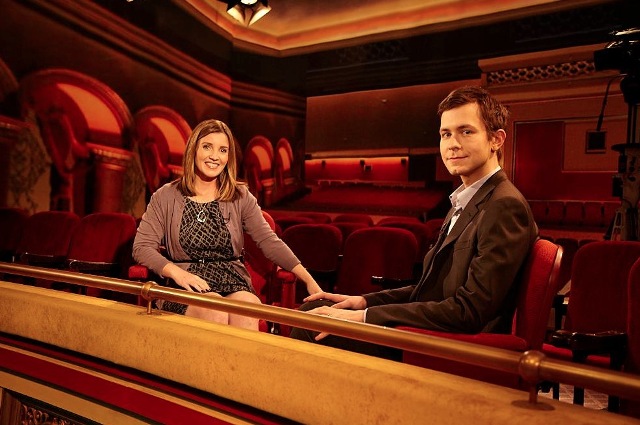CHICAGO – Patrick McDonald of HollywoodChicago.com appears on “The Morning Mess” with Dan Baker on WBGR-FM (Monroe, Wisconsin) on March 21st, 2024, reviewing the new streaming series “Manhunt” – based on the bestseller by James L. Swanson – currently streaming on Apple TV+.
Film News: Ignatiy Vishnevetsky Joins Christy Lemire on ‘Roger Ebert Presents At the Movies’
CHICAGO – The balcony is officially open and back in business at WTTW Chicago, the same network where Roger Ebert and Gene Siskel hosted “Sneak Previews” roughly 35 years ago. On Friday, Jan. 21 at 8:30pm CST, public television stations nationwide will premiere “Roger Ebert Presents At the Movies,” the latest reinvention of the celebrated TV series championing the art of film criticism.
Christy Lemire of The Associated Press and Ignatiy Vishnevetsky of Mubi.com will serve as co-hosts of the program, which is executive produced by Ebert and his wife Chaz, and directed by “Siskel & Ebert” veteran Don Dupree. The hosts will be joined each week by an alternating group of contributing critics offering their own distinctive segments on cinema. Kim Morgan of Sunset Gun, Omar Moore of The Popcorn Reel, Kartina Richardson of Mirrorfilm.org, Jeff Greenfield of CBS, Nell Minow of Beliefnet.com, and David Poland of Movie City News will be among the contributors.
Ebert fans will be pleased to know that the Pulitzer Prize-winning critic and TV icon will be hosting a special segment of his own, courtesy of his automated voice program. On “Chicago Tonight,” Chaz broke the news that Roger’s voice in the pilot will be provided by legendary filmmaker (and master vocal artist) Werner Herzog. The show will be distributed nationwide by APT (American Public Television).

Christy Lemire and Ignatiy Vishnevetsky are the co-hosts of “Roger Ebert Presents At the Movies”.
Photo credit: PBS
Most of the show’s press prior to the premiere has centered on the 24-year-old Vishnevetsky. In addition to his work for Mubi.com and The Chicago Reader, Vishnevetsky is co-founder of the alternative cinema website Cine-File.info, and co-manager of the great underground video store, Odd Obsessions. Hollywood Chicago spoke with Vishnevetsky mere hours before his show’s much-hyped premiere.
HollywoodChicago.com: You dropped out of Columbia College after a few semesters. What are your thoughts about the effectiveness of film school?
Ignatiy Vishnevetsky: Film school is a very weird thing because it’s all about learning details with no real discussion of bigger issues. On the one hand, you develop a very strong technical knowledge, but on the other hand, going to film school isn’t going to make you a filmmaker. It can make you a very good first assistant director, or first assistant cameraman or gaffer or first assistant editor. But it’s not going to make you an actual cinematographer, editor or director. Those kinds of things come from somewhere else, and it’s something that you learn in ways other than learning how to pull focus or learning how to load a Bolex. Learning how to keep a shot in focus in the easy part. The hard part is figuring out what it is that you want to be in focus in the shot. Part of the reason I left was because I wanted to know that. But another equally true reason was because I was a terrible student.
HollywoodChicago.com: What has the challenge been like in adapting your written film analysis into televised commentary?
Vishnevetsky: It’s difficult. The best way is to try not transforming your writing into speaking. My writing is a product of who I am, my opinions and thought processes. But I don’t write the way I talk, and I can’t talk the way I write. It’s very difficult to get so many parentheses and semicolons across in conversation. So you have to start from square one and go back to your core ideas.
HollywoodChicago.com: You’ve cited Jonathan Rosenbaum as a major influence on your work. How so?
Vishnevetsky: Rosenbaum was the first critic I think I read regularly and not indifferently. He was, in many ways, an entry into the world of film criticism. During his tenure at The Chicago Reader, he had, for the most part, unlimited length for his reviews. He could write for however long he wanted, and for the most part, he could write about whatever he wanted. I would say that his [tenure] was the most fertile creative period for any one writer in the history of American newspaper film criticism.
The two things that were most attractive about Rosenbaum as a critic were, first of all, he never forgot that as a film critic, he was a writer. His original intention was to become a fiction writer, and he just ended up writing film criticism. Out of all film critics, he’s one of the most beautiful writers. But the second thing was his honesty about himself in his opinions, and if his reactions to a movie were not entirely objective. For example, he doesn’t like films about torture. He makes no secret about that, and writes about it in the first person. He never attempts to turn his own experience of cinema into an authority, rather he draws on that experience to try and engage with cinema as a whole. But he never pretends that his is the definitive opinion.
 Ebert Presents At the Movies premieres Friday, Jan. 21 at 8:30 CST on PBS. Photo credit: PBS |
HollywoodChicago.com: What current directors do you believe aren’t getting the recognition they deserve?
Vishnevetsky: There are so many. Let’s talk about American cinema. James Gray is a perfect example. He’s a great link to the directing traditions of the ’50s and the ’70s, but at the same time, his films are thoroughly modern. Abel Ferrara, who’s kind of damned, unfortunately. He can’t even get a film made in New York, his hometown. He has to shoot documentaries. He had to shoot “Go Go Tales” in Italy. Tony Scott is actually a much better director than Ridley Scott, which seems to becoming a less and less controversial opinion every year. His films show an intelligence that I think a lot of people aren’t willing to ascribe to him, and I find the aesthetic, thematic territory that he’s exploring to be really fascinating. Michael Mann is pretty famous but I won’t rest until everyone considers him to be the greatest living American filmmaker, so I’d still say he’s not quite getting his due.
HollywoodChicago.com: Why do you consider Claire Denis to be the greatest living filmmaker?
Vishnevetsky: Denis introduces the most radical changes. “The Intruder” may be the most revolutionary film since Tati’s “Playtime,” in that it’s a complete break from psychology. We don’t really talk about it, but the history of psychology is very firmly tied to development in literature and film aesthetics. “The Intruder” is a completely anti-psychological film just in terms of its style and editing, camera placement and movement. When we make movies, we still tend to take our inspiration from how we see the world. Directors are trying to express what it’s like to perceive something. Bresson is a very good example. An interviewer asked him about a shot in one of his films, which I believe was “The Devil Probably.” The shot was of feet in a crowd, and the interviewer asked him why it was just a shot of the feet. And Bresson said, “Because when I looked at the crowd, all I could think of was just all these people walking, and it would be dishonest to point the camera elsewhere.”
But in “The Intruder,” it’s not about trying to show what it’s like to experience something. It’s all about what it’s like not to experience something. It’s always cutting and framing these moments that are imperceptible perhaps to the characters. It’s trying to portray people by removing itself from the way they would normally experience the world. It has this very elliptical editing style, and at first it may seem like it’s jumbled and confusing, but if you really think about it, it’s incredibly straightforward. It is completely unhindered by these ideas of how narratives are supposed to progress, how characters are supposed to be introduced. Obviously there’s a plot going on, but normally those are tied to very conventional, psychological ideas. The film is unencumbered by any of those things. It simply moves along its own trajectory.
 | By MATT FAGERHOLM |


